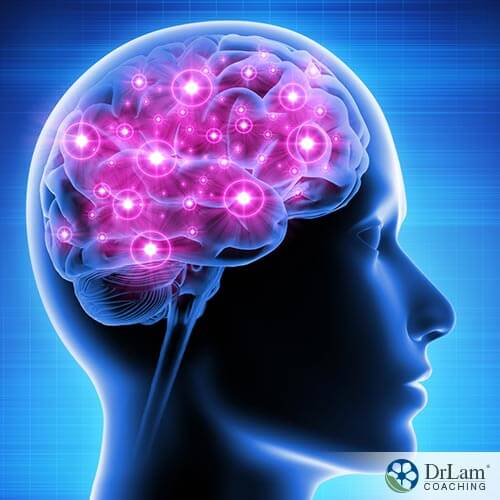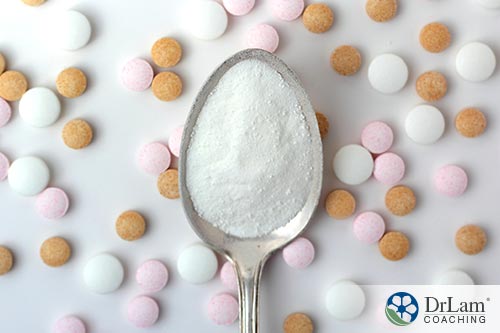Your brain is responsible for every thought or action you take. It is also the center of your feelings, whether good or bad. Inositol plays an important role in your brain's neurotransmitter function and we will dive into how important this nutrient is.
 Your brain has many neurotransmitters, like serotonin, acetylcholine, dopamine, gamma-Aminobutyric acid (GABA), and norepinephrine. These neurotransmitters are chemical messengers that allow for the passing of information between different parts of your brain as well as to different parts of your body. And these neurotransmitters all rely on inositol to relay these messages. It is thus not surprising to learn that the highest inositol concentrations in your body are thus in your brain.
Your brain has many neurotransmitters, like serotonin, acetylcholine, dopamine, gamma-Aminobutyric acid (GABA), and norepinephrine. These neurotransmitters are chemical messengers that allow for the passing of information between different parts of your brain as well as to different parts of your body. And these neurotransmitters all rely on inositol to relay these messages. It is thus not surprising to learn that the highest inositol concentrations in your body are thus in your brain.
But besides its important role in proper neurotransmitter function, inositol helps in the breaking down of fats and helping to give cells their shape. And many of us find ourselves in a position where, for whatever reason, our bodies do not make enough inositol to fulfill its important function. As a result, many of us find ourselves in a position where we start developing certain psychological health issues.
Mainstream medicine may resort to giving you mood-changing medications to help your cope with your health issues, while the cause of your problem is that your body does not manufacture the needed amounts of inositol to allow for proper neurotransmitter function.
Your body’s built-in mechanism of handling stress, the NeuroEndoMetabolic (NEM) stress response, consists of different biological and associated physiological systems. This NEM stress response is governed by your Hypothalamic-Pituitary-Adrenal (HPA) axis. The HPA makes use of neurotransmitters to engage between its three parts, as well as your other systems and signals what needs to be done.
Now, the moment you experience stress, it triggers your ‘fight or flight’ response that sees an increase in the release of certain neurotransmitters as well as cortisol production, a stress hormone. If stress continues, however, your body continues producing elevated levels of cortisol, particularly in your adrenal glands. But at the same time, the persistent ‘fight or flight’ response sees a decrease or complete stop in certain body functions. One of these is the production of certain hormones, including certain hormones in the brain that act as neurotransmitters. Taking into consideration the possibility of your body producing too little inositol, and you have a recipe for disaster.
The continued increased elevated cortisol production, together with a decline in the production of certain hormones and too little inositol to help with neurotransmission could see a whole set of health issues developing. Besides adrenal fatigue, you could also end up with a hormonal imbalance which, in the brain, could lead to anxiety, depression, and other mental health issues. And we have not even touched on aspects like compromised heart health and others.
Ultimately, inositol helps prevent these mental health issues mentioned due to its relaxation effect. This is because it promotes the release of serotonin, a ‘feel-good’ hormone. And while you can increase your inositol levels by eating certain foods like bran, nuts, and seeds, it is in the form of phytate, that the human digestive system finds it difficult to digest.
People who struggle to relax may find great benefit from using inositol. Strangely, and for reasons not as yet fully understood, it tends to work better on men than women in helping to address such issues as binge eating or anxiety. It may also help provide relief for those women suffering from PMS.
We have already mentioned that inositol promotes relaxation due to its promotion of serotonin release. It may also, however, benefit people suffering from anxiety, agoraphobia, post-traumatic stress disorder (PTSD), panic disorder, and obsessive-compulsive disorder.
Practitioners of conventional medicine may often suggest the use of certain anti-anxiety medications. These medications, however, do not work for all people with many finding great difficulty in dealing with the side effects. Inositol, a natural supplement, does not have these side effects. Furthermore, research suggests it may be as effective in reducing panic attacks as certain well-known medications.
 Roughly twice as many women as men suffer from depression. This could possibly be linked to the fact that women go through menopause with all its associated hormonal changes and possible resulting imbalances. Interestingly, people suffering from depression have lower inositol levels than those who do not have this mental health issue. One may think the logical conclusion would be to advise these people to take an inositol supplement.
Roughly twice as many women as men suffer from depression. This could possibly be linked to the fact that women go through menopause with all its associated hormonal changes and possible resulting imbalances. Interestingly, people suffering from depression have lower inositol levels than those who do not have this mental health issue. One may think the logical conclusion would be to advise these people to take an inositol supplement.
Studies for using inositol in people with depression show positive results. In one study, for example, participants showed a vast improvement in their depression when supplementing with inositol and, what is more, continued showing this improvement after weaning off the antidepressant medications.
On the whole, it seems that any mood disorder that positively responds to serotonin-boosting medications also shows a positive response when supplementing with inositol.
Mood swings are common in PMS and premenstrual dysphoric disorder in women. It also helps with the depression and anxiety commonly associated with these conditions. The supplement may also help those suffering from PCOS, a condition resulting from a hormonal imbalance. This seems to do by normalizing your testosterone and insulin levels.
Studies suggest inositol may help reduce certain symptoms associated with bulimia nervosa. This eating disorder is associated with binge eating and purging, but it is also associated with depression and anxiety. Interestingly, here too the supplement seems less effective in its action in men than in women.
OCD is an anxiety disorder. People with OCD often have unwanted or recurring thoughts as well as behaviors. They seem unable to control these issues. Several studies, however, show that when supplementing with inositol, those with OCD often find a reduction in their symptoms. One study went so far as to show that the supplement worked as well for OCD as those suggested by the conventional medical establishment with one added bonus: inositol did not have the side effects.
Although very little research has thus far looked at the effects of the supplement on people suffering from bipolar disorder, two pieces of evidence sound promising.
Firstly, it may help address one of the side effects of lithium-induced psoriasis. Lithium is a common drug used in the treatment of this disorder. Furthermore, it does not affect the drug’s effects in any way. It is believed the drug reduces your inositol levels.
Secondly, inositol may help with depressive symptoms associated with the disorder.
 Inositol, largely considered safe, has no known interactions with medications or other supplements. However, people have reported some side effects. These include headaches, dizziness, insomnia, and upset stomachs. But these side effects may result from taking very large dosages. Furthermore, pregnant women should refrain from taking inositol because it may induce uterine contractions. It is best to use this supplement with the guidance of a qualified healthcare practitioner who can advise on suitability and dosage.
Inositol, largely considered safe, has no known interactions with medications or other supplements. However, people have reported some side effects. These include headaches, dizziness, insomnia, and upset stomachs. But these side effects may result from taking very large dosages. Furthermore, pregnant women should refrain from taking inositol because it may induce uterine contractions. It is best to use this supplement with the guidance of a qualified healthcare practitioner who can advise on suitability and dosage.
Overall, the supplement may boost brain function, mood, and focus while encouraging a relaxed state and improving your quality of sleep.
If you have Adrenal Fatigue Syndrome, you may find that taking inositol causes an opposite reaction. Often times the automatic and reasonable option is to take these supplements hoping it will make you feel better. However, people with AFS could have paradoxical reactions and could end up actually harming your body. This is why it is especially important to find an experienced practitioner who can help guide you through your recovery journey, knowing when and how to start supplementation at the right time.
If you are consistently anxious, tired, depressed, or find it difficult to relax, here are some things you can do about the situation.
Do remember, however, that some people may have side effects when using high dosages of this supplement. Your healthcare practitioner is best suited to advise on its suitability and dosage.
If you would like to know more about inositol and its benefits, the team at Dr. Lam Coaching can help. We offer a free** no-obligation phone consultation at +1-626-571-1234 where we will privately discuss your issues, concerns, and options. You can also send us a question through our Ask The Doctor system by clicking here.
Hormonal imbalance and compromised neurotransmitter function could both help advance adrenal fatigue. But while inositol does not directly affect your adrenal health, it does in a roundabout way. This it does by improving neurotransmitter function and brain hormone production. So, yes, inositol could help fight adrenal fatigue, albeit indirectly.
